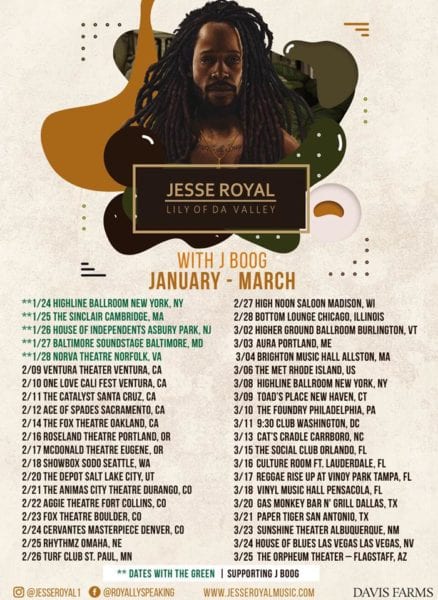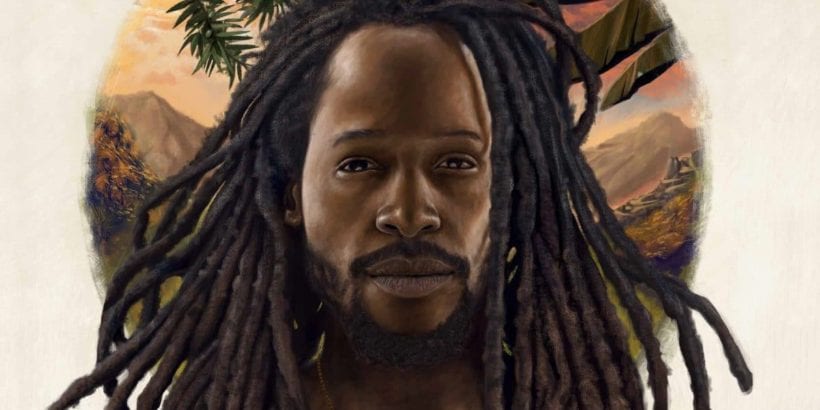
Jesse Royal Talks Reggae, Spirituality, the Making of His Chart-Topping Debut Album and Bringing Positivity to the World
There’s a new voice rising out of Jamaica’s conscious reggae scene that celebrates wisdom, spirituality and positivity at a time when chaos appears to be the order of the day. Jamaican singer/songwriter Jesse Royal is not only a champion for roots reggae and its Rasta-influenced lyrics and indomitable riddims but also an ambassador for positive thinking and action as forces for change in the world.
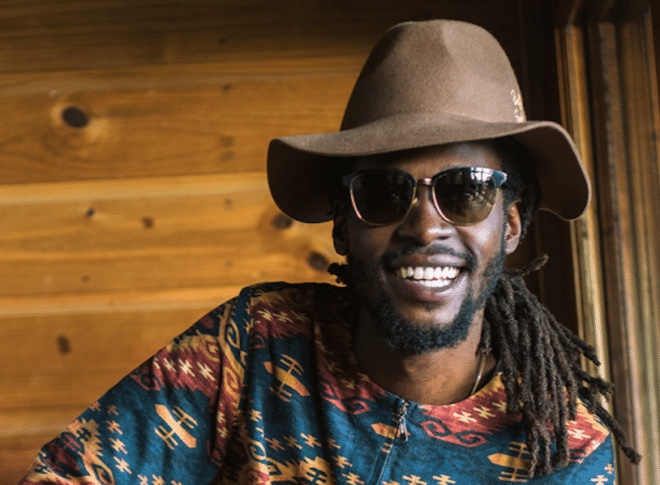
Royal, 28, began singing at an early age where his mother was leader of the church choir. In 1997 his family moved to Kingston, where the seeds of his musical career were planted and where he met Daniel Bambata Marley, son of Ziggy Marley and grandson of reggae legend Bob Marley. While at school together, the two shared a love of soccer and music. Another schoolmate, Kareem Burrell, introduced Royal to his father, legendary producer and Exterminator Records founder Fatis Burrell. The elder Burrell served as mentor to Royal until his death in 2010, and Kareem Burrell, a successful producer and composer in his own right, remains a close friend and collaborator to this day.
Popular mix tapes like “In Comes The Small Axe” and hit singles such as “Modern Day Judas” quickly established Royal as a leading voice of Jamaica’s conscious Reggae revival movement. His singjay style touches on old-school reggae, yet his varied musical tastes, including soul, bass music, electronic dance and more, speak to a more progressive scene and a broad audience.
Royal’s stunning debut album Lily Of Da Valley was released in October of 2017 and quickly rose to number one on Billboard’s Reggae charts. The album reflects Royal’s diverse musical and spiritual journey that has placed him firmly among a young generation of artists whose work celebrates unity and positivity.
Currently on an extensive U.S. tour in support of the album, RoyaI sat down with me recently to talk about his work, spirituality and thoughts on the future.
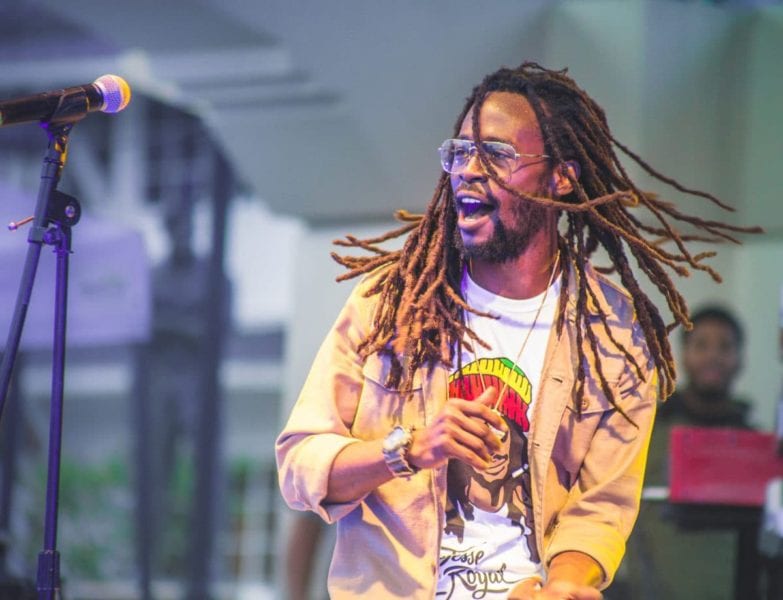
MFN: Thank you for taking the time to speak to me today, Jesse. I’d like to ask to you a little bit about the message of positivity that seems to be the focus of your art and your music in addition to your album. I understand that you do not like being lumped in with the term “Reggae Revival.” How do feel about that label?
JR: I wouldn’t say they I don’t like being lumped in. But you know, as I like to say, we now serve a master that stretches far beyond any genre or any time. I come from such a sacred beginning – from our first shared joys as a community, as I say, our shared sorrows. So as far as music is concerned, we pledge allegiance to music not a genre.
So, the message now is imperative because of the times that we are living in. So, it’s not just about saying this. It is an understanding that there is a need for this message in the bigger picture of the potential of mankind.
Sometimes it’s not that we are whatever. It’s that some things are just so trivial because we know the reality of mankind. So what you can’t understand, it is very hard to digest. So therefore you have people who like to label things. Because when you label things, it’s a lot easier for them to understand, and it’s a lot easier for them to put this in a box and say this is what it is.
But in reality, all of us are together as musicians more than people that you may know. Because, you know, this whole movement, as we like to call it, there are also chefs offering alternative cuisine for people. There are people offering books at a cost, or not, to make information readily available to the youths of today. You have musicians. You have artists. You have poets. You have potential politicians. You have lawyers, doctors. You have everybody. Like, it’s a whole movement.
We don’t want them to put it in a whole Reggae revival thing. No, you are trying to dampen the greatness of the movement of this generation. We love the concept, but really and truly labeling is just what people do because they need to put something somewhere. And they need to be able to identify it because they think they know it.
We try to keep ourselves as conscious as possible that we are citizens of the world not citizens of a certain place.
Like when I tell somebody, the other day, “You know it’s lovely to feel American, but don’t you pledge your allegiance to a country. You pledge your allegiance to your creator.” See, whatever country you’re in in the world, you’ll do your best for your fellow man.
So when we now start to realign ourselves with this grandness that is the universe, I feel we will start stepping into a different light. Until we can banish ego, we fight a losing battle.
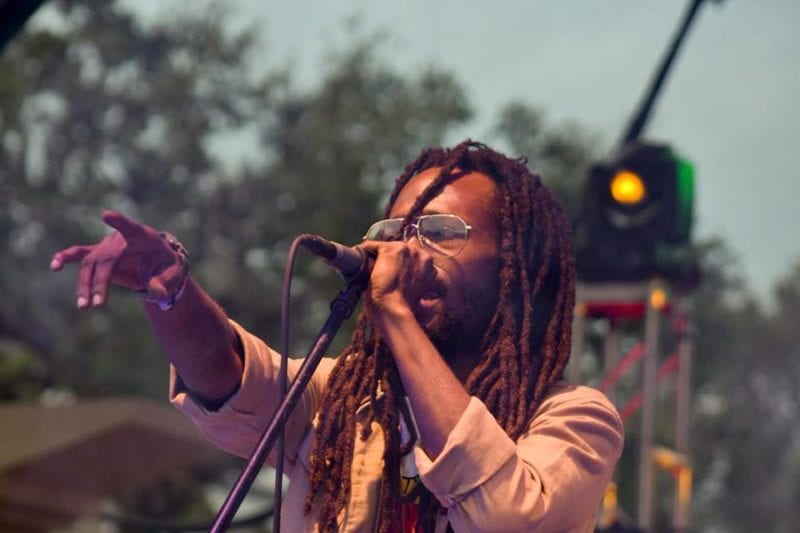
Photo Courtesy Rootfire
MFN: Obviously from that beautiful answer, you’re a very spiritual person. You are practicing Rastafarian?
JR: Yah. We live it. We Rastafari.
MFN: Tell me how that spirituality influences your music and your art.
JR: Spirituality now is what leads us to do what we do, when we do it and why we do it. So with Rastafari, now – a different level of consciousness, a different level of mindfulness, a different level of understanding how much control we really have as beings.
You know you really don’t get taught elsewhere because everywhere else, and I mean schools and all of ‘dem ‘tings, they really just teach you how to be employed. Or they teach you how to fit in a system that was created by someone to make something work.
Now with Rastafari, you get a consciousness of how to make the world work – how you fit in in a bigger picture of this universe. You are me and I am you, You know. We are connected in ways we will never be able to comprehend until we drip the ego, which makes you get up and say, “I am this, and you are that. And I am from here and you are from there. And I have this and live here and I am there.” You know?
MFN: Do you feel this leaves you open for your art and music?
JR: Yeah, man. It definitely leaves me open for my art in a sense, but open with a consciousness. As I say, Rastafari is a light – a way of life where you can’t get up on Sunday and say, “I am Rasta.” You know, it’s every day. It’s how you think. It’s how you eat. It’s how you live. It’s your mentality toward others. It’s not really about who you are. It’s what can you be for the world. You know. How can you be in the greatest level of servitude possible?
So Rastafari is that light. With that light came a different level of brightness for me and that is going to show itself in my work – whether it’s in my music now, or whether I write a book in the future, whether we produce some TV series.
MFN: Do you see a TV series in your future?
JR: Yeah, man. Everything, everything. Because we have to get the consciousness. Because the world has such a great potential. Every generation’s duty is to show the next generation a little bit more. You understand? So our ancestors built the pyramids to show great ways.
But should we maintain that consciousness and maintain who we are and how connected we are? Then can you imagine those pyramids 2,000 or 10,000 years ago and how much more developed that technology would have been now if we maintained that connection?
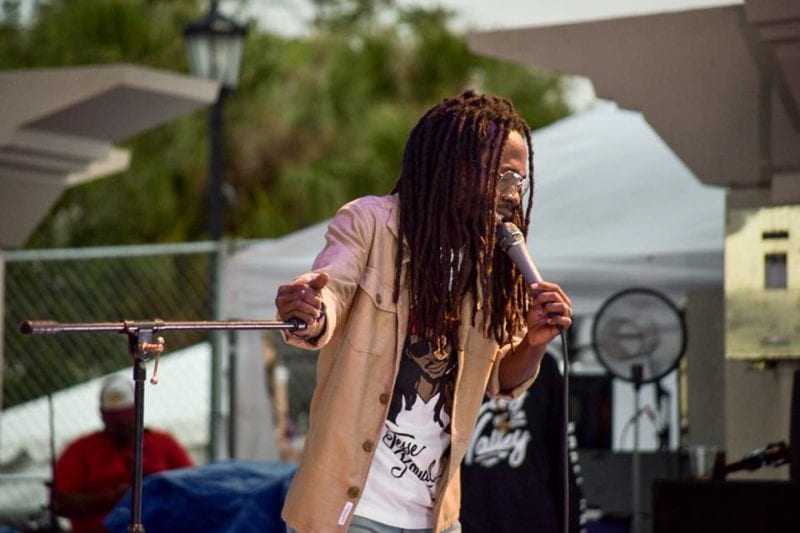
MFN: I’d like to ask you about Lily Of Da Valley. Congratulations reaching number one on the Billboard Reggae charts. I understand that you named the album for a hymn you heard in church with your grandmother. What about that hymn spoke to you?
JR: As a youngster, this was just a hymn that resonated with me just from a sonic level first and a spiritual level where it feel good. Every time I heard this, it felt good. Now, the older you grow and the more conscious you get, you are able to dissect concepts. So when we really see what this Lily Of Da Valley thing is, it resonated even more.
Long story short, when it reached time now for the album, we did a short list of names and titles; the more this song came together the more it pointed towards that concept. So, just like everything else in a life, we live true. I don’t know why that resonated with me, because that wasn’t the only hymn in the hymnbook.
It’s like, why you choose your wife? Why you choose your husband? It’s like, you know, there are a hundred universities in your area, but this one speaks to you a little bit more. You know. So, just like everything in life, it’s what your antennae catch.
MFN: This album is so diverse. There’s a little EDM going on in there. There’s a little trip hop going on in there. There’s so much going on in there. Is this album something that came about organically, or was it planned?
https://www.youtube.com/watch?v=ZdzQpJPdu2Y
JR: Organic. I have these voice memos on my phone. All of these songs really started from the dirt. But we come from a generation, like I was discussing with someone the other day – Walkmans and CD players to MP3 players to YouTube – all of this that gave us the opportunity to decide what we wanted to hear. So with that came whole different influences.
At 13 years old I wasn’t only listening to what the radio was playing in Jamaica. Yeah, I was listening to hip hop in America. I could hear “Mambo No. 5.” I heard the pop music like the Backstreet Boys and all of ‘dem type of youth. So we as youths knew all of these things that were going on around us.
So you can’t change the fact that we were influenced by these many genres. So that is going to play a big part in how we make music also. Because the reality is we are all sponges. We are all influenced.
And then we speak to such a diverse audience. You know what I mean? It’s not like we only preach to the choir. We also have to be creative enough to make music that is palatable enough to reach other people.
MFN: Last question. If you had to leave your fans, new and old, with one message, what would it be?
JR: Let your love show. If you really believe in love, let it show. Wherever you are and whatever you do, let your love show. Rastafari.
